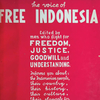Indonesian Mockery of the Dutch during the Indonesian Struggle to Maintain Independence (1945-1948)
DOI:
https://doi.org/10.51769/bmgn-lchr.6885Keywords:
political humour, ridiculing the enemy, political opposition, popular revolts, independence struggle, Dutch-Indonesian conflictAbstract
Research on the struggle for Indonesian independence (1945-1949) and the harsh response of the Dutch to their former colony is abundant, with most studies focusing on the nature and forms of violence. One neglected area of research is how Indonesian nationalists represented the conflict in the form of mockery. This study intends to fill this gap by examining mocking textual representations of the Dutch, created and disseminated by Indonesians through print media. By 1945, the Indonesians had declared their independence and considered themselves fully capable of taking care of their new country. When the Dutch tried to take back rule in Indonesia, they were sarcastically accused of trying to recolonise Indonesia by cruel means. By contrasting the good ‘us’ with the bad ‘them’, mocking representations became a way for Indonesians to ridicule the Dutch. In these representations, the Dutch were portrayed as the people of a tiny country – compared to a large Indonesia – who were colonial-minded in an equal post-war world. Indonesians moreover emphasised the weak authority of the Dutch in Java and depicted them as perpetrators who falsely arrested innocent Indonesians, as producers of false propaganda, and as people who often boasted to be clever but actually lacked knowledge and were easily deceived by Indonesian fighters. This paper elucidates issues pertaining a type of representations that should be understood as an additional, yet often forgotten form of resistance against occupying foreign forces in the post-World War II era.
De Indonesische onafhankelijkheidsstrijd (1945-1949) en de felle response van de Nederlanders op hun voormalige kolonie is veelvuldig onderzocht, waarbij de meeste studies zich richten op de aard en de vormen van geweld. Een grotendeels verwaarloosd onderzoeksgebied is de vraag hoe Indonesische nationalisten het conflict verbeeldden in de vorm van spot. Dit artikel tracht deze leemte te vullen en onderzoekt spottende tekstuele representaties van Nederlanders, gemaakt en verspreid door Indonesiërs via gedrukte media. In 1945 hadden de Indonesiërs de onafhankelijkheid uitgeroepen en achtten zij zichzelf volledig in staat om hun eigen land te besturen. Toen Nederland probeerde de macht in Indonesië terug te grijpen, gebruikten Indonesiërs sarcasme om te wijzen op de wrede acties van de Nederlanders in hun pogingen het land te herkoloniseren. Door de goede ‘wij’ te contrasteren met de slechte ‘zij’, werden spottende representaties een manier voor Indonesiërs om de Nederlanders belachelijk te maken. In deze voorstellingen werden de Nederlanders onder andere afgeschilderd als het volk van een piepklein land – vergeleken met het grote Indonesië – dat in het naoorlogse klimaat van gelijkwaardigheid vasthield aan koloniale gebruiken en denkpatronen. Daarnaast benadrukten Indonesiërs het zwakke gezag van de Nederlanders op Java en schilderden zij hen af als daders die ten onrechte onschuldige Indonesiërs arresteerden, als makers van valse propaganda, en als mensen die er prat op gingen slim te zijn, maar in werkelijkheid dom waren en makkelijk te misleiden waren door Indonesische strijders. Door te focussen op dergelijke humoristische, satirische representaties, analyseert dit artikel een belangrijke, maar vaak vergeten vorm van verzet tegen bezettende buitenlandse machten in het tijdperk na de Tweede Wereldoorlog.
Current events paragraph
Making fun of the Dutch:
Mockery as a weapon for Indonesian nationalists during the Dutch-Indonesian war
Recently, the Dutch and Indonesian public’s attention to the history of the Dutch-Indonesian war (1945-1949) has been increasing sharply, including the most recent one in the De Oost movie (2020) which received a lot of comments in both countries. So far, scholars have largely underlined that the war between the Netherlands and Indonesia was carried out on the battlefield and at the diplomacy table. However, Indonesian nationalists actually had another ‘weapon’, namely mockery. Indonesian historian Muhammad Yuanda Zara in BMGN 136:3 (2021) explores mocking textual representations of the Dutch, created and disseminated by Indonesians through print media during the bloody conflict. His primary conclusion is that Indonesian nationalists widely used mockery to portray the Dutch as a menacing yet foolish ‘other’ during the war. They mocked the small geographical size of the Netherlands, the fragility of Dutch authority in Java, and the silly attitudes of the Dutch army. Moreover, they even ridiculed the Netherlands flag colors and the intelligence of the Dutch people. The mockery helped Indonesians to get through the harsh situation of war and implied a victory by ‘smart’ Indonesians over ‘ignorant’ Dutch.
Downloads

Published
Issue
Section
License
Copyright (c) 2021 Muhammad Yuanda Zara

This work is licensed under a Creative Commons Attribution 4.0 International License.
Authors who publish with this journal agree to the following terms:
a) Authors retain copyright and grant the journal right of first publication with the work simultaneously licensed under a Creative Commons Attribution 4.0 International (CC BY 4.0) that allows others to share the work with an acknowledgement of the work's authorship and initial publication in this journal.
b) Authors are able to enter into separate, additional contractual arrangements for the non-exclusive distribution of the journal's published version of the work (e.g., post it to an institutional repository or publish it in a book), with an acknowledgement of its initial publication in this journal.
c) Authors are permitted to post their work online (e.g., in institutional repositories or on their website) prior to and during the submission process.
Authors are explicitly encouraged to deposit their published article in their institutional repository.








